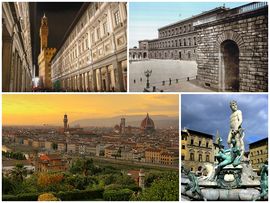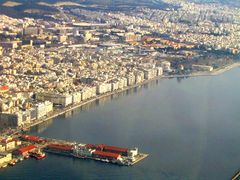European Capital of Culture
The European Capital of Culture is a city designated by the European Union for a period of one calendar year during which it is given a chance to showcase its cultural life and cultural development. A number of European cities have used the City of Culture year to transform their cultural base and, in doing so, the way in which they are viewed internationally. During the first two decades, cities were chosen primarily based on cultural history, scheduled events and the ability to provide infrastructural and financial support. A 2004 study conducted by Robert Palmer (known as the "Palmer Study") for the European Commission demonstrated that the choice of European Capital of Culture served as a catalyst for the cultural development and the transformation of the city.[1] Consequently, the beneficial socio-economic development and impact for the chosen city are now also considered in determining the chosen cities.
Contents |
History
The European Capital of Culture programme was initially called the European City of Culture and was conceived in 1983 by Melina Mercouri, then serving as Greek Minister of Culture. Mercouri believed that at the time, culture was not given the same attention as politics and economics and a project for promoting European cultures within the member states should be pursued. The European City of Culture programme was launched in the summer of 1985 with Athens being the first title-holder. During the German Presidency of 1999, the European City of Culture programme was renamed the European Capital of Culture.
List of European Cities/Capitals of Culture






Past years
- 1985:
 Athens
Athens - 1986:
 Florence
Florence - 1987:
 Amsterdam
Amsterdam - 1988:
 Berlin
Berlin - 1989:
 Paris
Paris - 1990:
 Glasgow
Glasgow - 1991:
 Dublin
Dublin - 1992:
 Madrid
Madrid - 1993:
.svg.png) Antwerp
Antwerp - 1994:
 Lisbon
Lisbon - 1995:
 Luxembourg
Luxembourg - 1996:
 Copenhagen
Copenhagen - 1997:
 Thessaloniki
Thessaloniki - 1998:
 Stockholm
Stockholm - 1999:
 Weimar
Weimar - 2000:
 Avignon,
Avignon,  Bergen,
Bergen,  Bologna,
Bologna, .svg.png) Brussels,
Brussels,  Helsinki,
Helsinki,  Kraków,
Kraków,  Prague,
Prague,  Reykjavík,
Reykjavík,  Santiago de Compostela
Santiago de Compostela - 2001:
 Rotterdam,
Rotterdam,  Porto
Porto - 2002:
.svg.png) Bruges,
Bruges,  Salamanca
Salamanca - 2003:
 Graz
Graz - 2004:
 Genoa,
Genoa,  Lille
Lille - 2005:
 Cork
Cork - 2006:
 Patras
Patras - 2007:
 Sibiu,
Sibiu,  Luxembourg,
Luxembourg, .svg.png)


 Greater Region
Greater Region - 2008:
 Liverpool,
Liverpool,  Stavanger
Stavanger - 2009:
 Vilnius
Vilnius  Linz
Linz
Present year
Future years
According to the official EU website[2]. The cities and countries from 2015-2025 are not yet finalised.
- 2011:
 Turku,
Turku,  Tallinn
Tallinn - 2012:
 Guimarães,
Guimarães,  Maribor
Maribor - 2013:
 Marseille,
Marseille,  Košice
Košice - 2014:
 Umeå,
Umeå,  Riga
Riga - 2015:
.svg.png) Mons,
Mons,  Czech Republic
Czech Republic - 2016:
 Spain,
Spain,  Poland
Poland - 2017:
 Denmark,
Denmark,  Cyprus
Cyprus - 2018:
 Netherlands,
Netherlands,  Malta
Malta - 2019:
 Italy,
Italy,  Bulgaria
Bulgaria - 2020:
 Romania,
Romania,  Serbia,
Serbia,  Ireland
Ireland - 2021:
 Greece,
Greece,  Croatia,
Croatia,  Switzerland
Switzerland - 2022:
 United Kingdom,
United Kingdom,  Macedonia,
Macedonia,  Turkey
Turkey - 2023:
 Norway,
Norway,  Lithuania,
Lithuania,  Bosnia and Herzegovina,
Bosnia and Herzegovina, - 2024:
 Germany,
Germany,  Ukraine,
Ukraine,  Albania
Albania - 2025:
 Austria,
Austria,  Iceland,
Iceland,  Montenegro
Montenegro
See also
- American Capital of Culture – a similar initiative among the American countries
- Arab Capital of Culture – a similar initiative among Arab countries
- Europalia
References
- ↑ Palmer, Robert. "Study on the European Cities and Capitals of Culture and the European Cultural Months (1995-2004)". European Commission. http://ec.europa.eu/culture/key-documents/doc926_en.htm. Retrieved 24 January 2010.
- ↑ Official EU website
- García, B. (2005) “De-constructing the City of Culture: The long term cultural legacies of Glasgow 1990” in: Review Issue of Urban Studies (vol 42, n5/6) (pp. 1–28)
- García, B. (2004) “Cultural Policy in European Cities: Lessons from Experience, Prospects for the Future” in: Special edition on Cultural Policy and Regeneration, Local Economy (vol 19, n4) (pp. 312–326)
- García, B. (2004) “Urban Regeneration, Arts Programming and Major events: Glasgow 1990, Sydney 2000 and Barcelona 2004” in: Gibson, L. & Stevenson, D. (Eds) Special Issue of the International Journal of Cultural Policy: Urban Space and the Uses of Culture (vol 10, n 1) (pp. 103–118)
External links
Current
Past
- Graz 2003
- Cork 2005
- Sibiu 2007
- Liverpool 2008
- Stavanger 2008
- Vilnius 2009 The Art Strike Biennial was organised by the Second Temporary Art Strike Action Committee – Alytus Chapter (STASAC-Alytus) in response to this.
- Linz 2009
Future
- Turku 2011
- Tallinn 2011
- Guimarães 2012
- Maribor 2012
- Marseille Provence 2013
- Košice 2013
- Rīga 2014
- Umeå 2014
- Mons 2015
Past candidate cities
- Gävle 2014
- Norrköping 2014
- Lund 2014
- Liepāja 2014 [1]
- Cēsis 2014
Future Candidates
Czech Republic
Poland
- Białystok 2016 - candidate city
- Bydgoszcz 2016 - candidate city
- Gdańsk 2016 - candidate city
- Lublin 2016 - candidate city - (en), (es), (ua)
- Łódź 2016 - candidate city
- Poznań 2016 - candidate city
- Szczecin 2016 - candidate city
- Toruń 2016 - candidate city
- Warszawa 2016 - candidate city
- Wrocław 2016 - miasto kandydujące PL - (Vrotslove 2016 - candidate city EN), (Breslavia 2016 - candidatos de la ciudad ES)
- Katowice 2016 - candidate city
Spain
- Alcalá de Henares 2016 - candidate city
- Burgos 2016 - candidate city
- Cáceres 2016 - candidate city
- Córdoba 2016 - candidate city
- Cuenca 2016 - candidate city
- Málaga 2016 - candidate city
- Las Palmas de Gran Canaria 2016 - candidate city
- Oviedo 2016 - candidate city
- Palma de Mallorca and the Balearic Islands 2016 - candidate city
- Pamplona 2016 - candidate city
- Santander 2016 - candidate city
- Donostia-San Sebastián 2016 - candidate city
- Segovia 2016 - candidate city
- Tarragona 2016 - candidate city
- Zaragoza 2016 - candidate city
Cyprus
- Pafos 2017 - candidate city
Denmark
Netherlands
- Den Haag 2018 - candidate city
- Den Haag 2018 (campaign blog) - candidate city
- Almere 2018 - candidate city
- Utrecht 2018 - candidate city
- BrabantStad 2018 - candidate city
- Maastricht 2018 - candidate city
Bulgaria
- Varna 2019 - candidate city
Italy
- Venice 2019 - candidate city
- L'Aquila 2019 - candidate city
- Matera 2019 - candidate city
- Siena 2019 - candidate city
Romania
Cluj-Napoca 2020 - candidate city
Iaşi 2020 - candidate city
Timişoara 2020 - candidate city
Serbia
External links
- European Commission - European Capitals of Culture
- Documentation Centre on European Capitals of Culture
|
|||||
